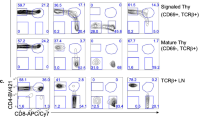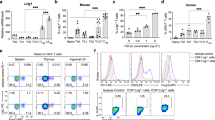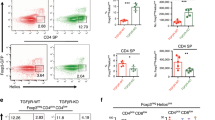Abstract
T cell–specific deletion of the receptor for transforming growth factor-β (TGF-β) mediated by Cre recombinase expressed early in T cell development leads to early-onset lethal autoimmune disease that cannot be controlled by regulatory T cells. However, when we deleted that receptor through the use of Cre driven by a promoter that is active much later in T cell development, adult mice in which most peripheral CD4+ or CD8+ T cells lacked the receptor for TGF-β showed no signs of autoimmunity. Because of their enhanced responses to weak stimulation of the T cell antigen receptor, when transferred into lymphopenic recipients, naive TGF-β-unresponsive T cells underwent much more proliferation and differentiation into effector cells and induced lymphoproliferative disease. We propose that TGF-β signaling controls the self-reactivity of peripheral T cells but that in the absence of TGF-β signals, an added trigger such as lymphopenia is needed to drive overt autoimmune disease.
This is a preview of subscription content, access via your institution
Access options
Subscribe to this journal
Receive 12 print issues and online access
$209.00 per year
only $17.42 per issue
Buy this article
- Purchase on Springer Link
- Instant access to full article PDF
Prices may be subject to local taxes which are calculated during checkout







Similar content being viewed by others
References
Li, M.O., Wan, Y.Y., Sanjabi, S., Robertson, A.K. & Flavell, R.A. Transforming growth factor-β regulation of immune responses. Annu. Rev. Immunol. 24, 99–146 (2006).
Massagué, J. TGFβ in cancer. Cell 134, 215–230 (2008).
Blobe, G.C., Schiemann, W.P. & Lodish, H.F. Role of transforming growth factor β in human disease. N. Engl. J. Med. 342, 1350–1358 (2000).
Hill, C.S. Nucleocytoplasmic shuttling of Smad proteins. Cell Res. 19, 36–46 (2009).
Zhang, Y.E. Non-Smad pathways in TGF-β signaling. Cell Res. 19, 128–139 (2009).
Ikushima, H. & Miyazono, K. TGFβ signalling: a complex web in cancer progression. Nat. Rev. Cancer 10, 415–424 (2010).
Yang, L., Pang, Y. & Moses, H.L. TGF-β and immune cells: an important regulatory axis in the tumor microenvironment and progression. Trends Immunol. 31, 220–227 (2010).
Kulkarni, A.B. et al. Transforming growth factor β1 null mutation in mice causes excessive inflammatory response and early death. Proc. Natl. Acad. Sci. USA 90, 770–774 (1993).
Shull, M.M. et al. Targeted disruption of the mouse transforming growth factor-β1 gene results in multifocal inflammatory disease. Nature 359, 693–699 (1992).
Diebold, R.J. et al. Early-onset multifocal inflammation in the transforming growth factor β1-null mouse is lymphocyte mediated. Proc. Natl. Acad. Sci. USA 92, 12215–12219 (1995).
Bommireddy, R. et al. Elimination of both CD4+ and CD8+ T cells but not B cells eliminates inflammation and prolongs the survival of TGFβ1-deficient mice. Cell. Immunol. 232, 96–104 (2004).
Rudner, L.A. et al. Necroinflammatory liver disease in BALB/c background, TGF-β1-deficient mice requires CD4+ T cells. J. Immunol. 170, 4785–4792 (2003).
Letterio, J.J. et al. Autoimmunity associated with TGF-β1-deficiency in mice is dependent on MHC class II antigen expression. J. Clin. Invest. 98, 2109–2119 (1996).
Gorelik, L. & Flavell, R.A. Abrogation of TGFβ signaling in T cells leads to spontaneous T cell differentiation and autoimmune disease. Immunity 12, 171–181 (2000).
Lucas, P.J., Kim, S.J., Melby, S.J. & Gress, R.E. Disruption of T cell homeostasis in mice expressing a T cell-specific dominant negative transforming growth factor βII receptor. J. Exp. Med. 191, 1187–1196 (2000).
Li, M.O., Sanjabi, S. & Flavell, R.A. Transforming growth factor-β controls development, homeostasis, and tolerance of T cells by regulatory T cell-dependent and -independent mechanisms. Immunity 25, 455–471 (2006).
Marie, J.C., Liggitt, D. & Rudensky, A.Y. Cellular mechanisms of fatal early-onset autoimmunity in mice with the T cell-specific targeting of transforming growth factor-β receptor. Immunity 25, 441–454 (2006).
Fontenot, J.D., Gavin, M.A. & Rudensky, A.Y. Foxp3 programs the development and function of CD4+CD25+ regulatory T cells. Nat. Immunol. 4, 330–336 (2003).
Li, M.O., Wan, Y.Y. & Flavell, R.A. T cell-produced transforming growth factor-β1 controls T cell tolerance and regulates Th1- and Th17-cell differentiation. Immunity 26, 579–591 (2007).
Liu, Y. et al. A critical function for TGF-β signaling in the development of natural CD4+CD25+Foxp3+ regulatory T cells. Nat. Immunol. 9, 632–640 (2008).
Marie, J.C., Letterio, J.J., Gavin, M. & Rudensky, A.Y. TGF-β1 maintains suppressor function and Foxp3 expression in CD4+CD25+ regulatory T cells. J. Exp. Med. 201, 1061–1067 (2005).
Starr, T.K., Jameson, S.C. & Hogquist, K.A. Positive and negative selection of T cells. Annu. Rev. Immunol. 21, 139–176 (2003).
Sprent, J. & Surh, C.D. Normal T cell homeostasis: the conversion of naive cells into memory-phenotype cells. Nat. Immunol. 12, 478–484 (2011).
Kieper, W.C. et al. Recent immune status determines the source of antigens that drive homeostatic T cell expansion. J. Immunol. 174, 3158–3163 (2005).
Min, B., Yamane, H., Hu-Li, J. & Paul, W.E. Spontaneous and homeostatic proliferation of CD4 T cells are regulated by different mechanisms. J. Immunol. 174, 6039–6044 (2005).
King, C., Ilic, A., Koelsch, K. & Sarvetnick, N. Homeostatic expansion of T cells during immune insufficiency generates autoimmunity. Cell 117, 265–277 (2004).
Krupica, T. Jr., Fry, T.J. & Mackall, C.L. Autoimmunity during lymphopenia: a two-hit model. Clin. Immunol. 120, 121–128 (2006).
Le Campion, A. et al. Lymphopenia-induced spontaneous T-cell proliferation as a cofactor for autoimmune disease development. Blood 114, 1784–1793 (2009).
Hale, J.S., Ames, K.T., Boursalian, T.E. & Fink, P.J. Cutting edge: Rag deletion in peripheral T cells blocks TCR revision. J. Immunol. 184, 5964–5968 (2010).
Zhang, D.J. et al. Selective expression of the Cre recombinase in late-stage thymocytes using the distal promoter of the Lck gene. J. Immunol. 174, 6725–6731 (2005).
El-Asady, R. et al. TGF-β-dependent CD103 expression by CD8+ T cells promotes selective destruction of the host intestinal epithelium during graft-versus-host disease. J. Exp. Med. 201, 1647–1657 (2005).
Feng, T., Wang, L., Schoeb, T.R., Elson, C.O. & Cong, Y. Microbiota innate stimulation is a prerequisite for T cell spontaneous proliferation and induction of experimental colitis. J. Exp. Med. 207, 1321–1332 (2010).
Zehn, D., Lee, S.Y. & Bevan, M.J. Complete but curtailed T-cell response to very low-affinity antigen. Nature 458, 211–214 (2009).
Doisne, J.M. et al. iNKT cell development is orchestrated by different branches of TGF-β signaling. J. Exp. Med. 206, 1365–1378 (2009).
Ouyang, W., Beckett, O., Ma, Q. & Li, M.O. Transforming growth factor-β signaling curbs thymic negative selection promoting regulatory T cell development. Immunity 32, 642–653 (2010).
Daniels, M.A. et al. Thymic selection threshold defined by compartmentalization of Ras/MAPK signalling. Nature 444, 724–729 (2006).
Levéen, P. et al. TGF-β type II receptor-deficient thymocytes develop normally but demonstrate increased CD8+ proliferation in vivo. Blood 106, 4234–4240 (2005).
Acknowledgements
We thank S. Karlsson (Lund University) for Tgfbr2f/f mice; P.J. Fink (University of Washington, Seattle) for mice with transgenic expression of Cre from the distal Lck promoter; A.G. Farr for help with histology, T. Bergsbaken for help with the immunofluorescence microscopy; and P.J. Fink for comments on the manuscript. Supported by US National Institutes of Health (AI19335) and the Howard Hughes Medical Institute.
Author information
Authors and Affiliations
Contributions
N.Z. and M.J.B. designed experiments and wrote the paper, and N.Z. did the experiments.
Corresponding author
Ethics declarations
Competing interests
The authors declare no competing financial interests.
Supplementary information
Supplementary Text and Figures
Supplementary Figures 1–7 (PDF 4968 kb)
Rights and permissions
About this article
Cite this article
Zhang, N., Bevan, M. TGF-β signaling to T cells inhibits autoimmunity during lymphopenia-driven proliferation. Nat Immunol 13, 667–673 (2012). https://doi.org/10.1038/ni.2319
Received:
Accepted:
Published:
Issue Date:
DOI: https://doi.org/10.1038/ni.2319
This article is cited by
-
TGF-β-dependent lymphoid tissue residency of stem-like T cells limits response to tumor vaccine
Nature Communications (2022)
-
RNA polymerase II pausing factor NELF in CD8+ T cells promotes antitumor immunity
Nature Communications (2022)
-
Expanding CAR T cells in human platelet lysate renders T cells with in vivo longevity
Journal for ImmunoTherapy of Cancer (2019)
-
Transforming Growth Factor-beta signaling in αβ thymocytes promotes negative selection
Nature Communications (2019)
-
TOX is a critical regulator of tumour-specific T cell differentiation
Nature (2019)



